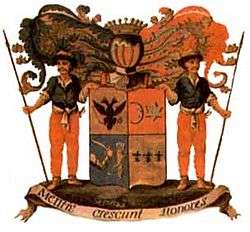Zubov
Zubov (Russian: Зу́бов) was a Russian noble family which rose to the highest offices of state in the 1790s, when Platon Zubov succeeded Count Orlov and Prince Potemkin as the favourite of Catherine II of Russia.

The Zubovs were first noticed in the service of Muscovite dukes in the 15th century. Nikolay Vasilievich Zubov (1699–1786) served in the Collegium of Economics, and his son Alexander Zubov (1727–1795) was reputed to have enriched himself serving as Vice-Governor of Vladimir. He had one daughter and four sons and in 1793 together with his sons, he received the title of Count.[1]
- Nicholas Zubov (1763-1805) was made general when his family was still in power. Known as a strongman, he served in Suvorov's army, supported the Field Marshal in his intrigues against Prince Potemkin and married his only daughter. It was he who dealt a violent blow to Tsar Paul's left temple with a solid gold snuffbox on the night of his assassination.
- Dmitry Zubov (1764-1835), major general in the Imperial Russian Army, is considered the founder of the Lithuanian branch of the family and dedicated himself later to agricultural matters. He was married to princess Praskovją Viazemskaja (Прасковья Александровна Вяземская, 1772-1835 ), with whom he had four daughters and only one son: Jezilaveta,Varvara, Catherine, Nicholas and Anna.[2]
- Platon Zubov(1767-1822) was introduced by his distant relative, Nicholas Saltykov, to the ageing Empress and soon became her lover and the most powerful man in Russia. He was the fourth (and last) Russian to bear the title of Prince of the Holy Roman Empire.
- Valerian Zubov (1771–1804) while serving under Suvorov in Poland, married a Princess Lubomirska and lost his leg in a toy battle. At the time of Catherine's death, he was leading the Russian army in Persia to avenge the Krtsanisi massacre.
- Their sister, Olga Zherebtsova, was involved with Nicholas Zubov in the assassination plot and fled Russia soon afterwards.
The lines of Count Nicholas and his brother Dmitry continue up to the present. Nicholas's great grandson Valentin (1884–1969) was a leading authority on the reign of Emperor Paul and authored several books on the subject. He founded the Gatchina Palace museum and the Art History Institute in St. Petersburg before emigrating to Paris in 1925. Dmitry's only son, Nicholas, merged with the local Lithuanian nobility and supported the Lithuanian National Revival characterized by cultural and educational activities.[3] So did his descendants.[4][5]
The Zubovs had two family vaults, one in Moscow, in the Donskoy Monastery, built in 1796-98, and another in Strelna near St. Petersburg, in the Maritime Monastery of St. Sergius, completed in 1809.
The last family living are Count and Countess Zubov and their two daughters Countess Tatjana Rainey and her children Anatole Rainey, Sasha Rainey and Xenia Rainey and Countess Irina Mendes de Leon and her children Feodora Mendes de Leon, Kyra Mendes de Leon and Carmen Mendes de Leon.